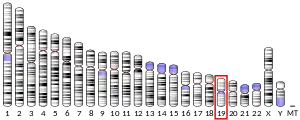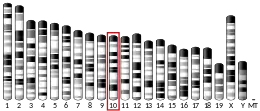DNA-directed RNA polymerases I, II, and III subunit RPABC1 is a protein that in humans is encoded by the POLR2E gene.[5]
This gene encodes the fifth largest subunit of RNA polymerase II, the polymerase responsible for synthesizing messenger RNA in eukaryotes. This subunit is shared by the other two DNA-directed RNA polymerases and is present in two-fold molar excess over the other polymerase subunits. An interaction between this subunit and a hepatitis virus transactivating protein has been demonstrated, suggesting that interaction between transcriptional activators and the polymerase can occur through this subunit. A pseudogene is located on chromosome 11.[6]
Interactions
POLR2E has been shown to interact with TAF15,[7] POLR2C,[8] POLR2G,[8] POLR2H,[8] POLR2A,[8] POLR2B,[8] POLR2L[8] and GTF2F2.[9]
References
- 1 2 3 GRCh38: Ensembl release 89: ENSG00000099817 - Ensembl, May 2017
- 1 2 3 GRCm38: Ensembl release 89: ENSMUSG00000004667 - Ensembl, May 2017
- ↑ "Human PubMed Reference:". National Center for Biotechnology Information, U.S. National Library of Medicine.
- ↑ "Mouse PubMed Reference:". National Center for Biotechnology Information, U.S. National Library of Medicine.
- ↑ Acker J, Mattei MG, Wintzerith M, Roeckel N, Depetris D, Vigneron M, Kedinger C (Aug 1994). "Chromosomal localization of human RNA polymerase II subunit genes". Genomics. 20 (3): 496–499. doi:10.1006/geno.1994.1208. PMID 8034326.
- ↑ "Entrez Gene: POLR2E polymerase (RNA) II (DNA directed) polypeptide E, 25kDa".
- ↑ Bertolotti, A; Melot T; Acker J; Vigneron M; Delattre O; Tora L (Mar 1998). "EWS, but not EWS-FLI-1, is associated with both TFIID and RNA polymerase II: interactions between two members of the TET family, EWS and hTAFII68, and subunits of TFIID and RNA polymerase II complexes". Mol. Cell. Biol. UNITED STATES. 18 (3): 1489–1497. doi:10.1128/mcb.18.3.1489. ISSN 0270-7306. PMC 108863. PMID 9488465.
- 1 2 3 4 5 6 Acker, J; de Graaff M; Cheynel I; Khazak V; Kedinger C; Vigneron M (Jul 1997). "Interactions between the human RNA polymerase II subunits". J. Biol. Chem. UNITED STATES. 272 (27): 16815–16821. doi:10.1074/jbc.272.27.16815. ISSN 0021-9258. PMID 9201987.
- ↑ Wei, W; Dorjsuren D; Lin Y; Qin W; Nomura T; Hayashi N; Murakami S (Apr 2001). "Direct interaction between the subunit RAP30 of transcription factor IIF (TFIIF) and RNA polymerase subunit 5, which contributes to the association between TFIIF and RNA polymerase II". J. Biol. Chem. United States. 276 (15): 12266–12273. doi:10.1074/jbc.M009634200. ISSN 0021-9258. PMID 11278533.
Further reading
- Jeang KT (1998). "Tat, Tat-associated kinase, and transcription". J. Biomed. Sci. 5 (1): 24–27. doi:10.1007/BF02253352. PMID 9570510.
- Yankulov K, Bentley D (1998). "Transcriptional control: Tat cofactors and transcriptional elongation". Curr. Biol. 8 (13): R447–9. doi:10.1016/S0960-9822(98)70289-1. PMID 9651670. S2CID 15480646.
- Romano G, Kasten M, De Falco G, et al. (2000). "Regulatory functions of Cdk9 and of cyclin T1 in HIV tat transactivation pathway gene expression". J. Cell. Biochem. 75 (3): 357–368. doi:10.1002/(SICI)1097-4644(19991201)75:3<357::AID-JCB1>3.0.CO;2-K. PMID 10536359. S2CID 43685090.
- Marcello A, Zoppé M, Giacca M (2002). "Multiple modes of transcriptional regulation by the HIV-1 Tat transactivator". IUBMB Life. 51 (3): 175–181. doi:10.1080/152165401753544241. PMID 11547919. S2CID 10931640.
- Stevens M, De Clercq E, Balzarini J (2007). "The regulation of HIV-1 transcription: molecular targets for chemotherapeutic intervention". Med Res Rev. 26 (5): 595–625. doi:10.1002/med.20081. PMC 7168390. PMID 16838299.
- Harrich D, McMillan N, Munoz L, et al. (2007). "Will diverse Tat interactions lead to novel antiretroviral drug targets?". Current Drug Targets. 7 (12): 1595–1606. doi:10.2174/138945006779025338. PMID 17168834.
- Kato H, Sumimoto H, Pognonec P, et al. (1992). "HIV-1 Tat acts as a processivity factor in vitro in conjunction with cellular elongation factors". Genes Dev. 6 (4): 655–666. doi:10.1101/gad.6.4.655. PMID 1559613.
- Pati UK, Weissman SM (1991). "Isolation and molecular characterization of a cDNA encoding the 23-kDa subunit of human RNA polymerase II". J. Biol. Chem. 266 (20): 13468. doi:10.1016/S0021-9258(18)98863-0. PMID 2071613.
- Southgate C, Zapp ML, Green MR (1990). "Activation of transcription by HIV-1 Tat protein tethered to nascent RNA through another protein". Nature. 345 (6276): 640–642. Bibcode:1990Natur.345..640S. doi:10.1038/345640a0. PMID 2190099. S2CID 4233742.
- Pati UK, Weissman SM (1989). "Isolation and molecular characterization of a cDNA encoding the 23-kDa subunit of human RNA polymerase II". J. Biol. Chem. 264 (22): 13114–13121. doi:10.1016/S0021-9258(18)51603-3. PMID 2753903.
- Wu-Baer F, Sigman D, Gaynor RB (1995). "Specific binding of RNA polymerase II to the human immunodeficiency virus trans-activating region RNA is regulated by cellular cofactors and Tat". Proc. Natl. Acad. Sci. U.S.A. 92 (16): 7153–7157. Bibcode:1995PNAS...92.7153W. doi:10.1073/pnas.92.16.7153. PMC 41297. PMID 7638159.
- Cheong JH, Yi M, Lin Y, Murakami S (1995). "Human RPB5, a subunit shared by eukaryotic nuclear RNA polymerases, binds human hepatitis B virus X protein and may play a role in X transactivation". EMBO J. 14 (1): 143–150. doi:10.1002/j.1460-2075.1995.tb06984.x. PMC 398061. PMID 7828586.
- Herrmann CH, Rice AP (1995). "Lentivirus Tat proteins specifically associate with a cellular protein kinase, TAK, that hyperphosphorylates the carboxyl-terminal domain of the large subunit of RNA polymerase II: candidate for a Tat cofactor". J. Virol. 69 (3): 1612–1620. doi:10.1128/jvi.69.3.1612-1620.1995. PMC 188757. PMID 7853496.
- Keen NJ, Gait MJ, Karn J (1996). "Human immunodeficiency virus type-1 Tat is an integral component of the activated transcription-elongation complex". Proc. Natl. Acad. Sci. U.S.A. 93 (6): 2505–2510. Bibcode:1996PNAS...93.2505K. doi:10.1073/pnas.93.6.2505. PMC 39827. PMID 8637904.
- Yang X, Herrmann CH, Rice AP (1996). "The human immunodeficiency virus Tat proteins specifically associate with TAK in vivo and require the carboxyl-terminal domain of RNA polymerase II for function". J. Virol. 70 (7): 4576–4584. doi:10.1128/jvi.70.7.4576-4584.1996. PMC 190394. PMID 8676484.
- Agostini I, Navarro JM, Rey F, et al. (1996). "The human immunodeficiency virus type 1 Vpr transactivator: cooperation with promoter-bound activator domains and binding to TFIIB". J. Mol. Biol. 261 (5): 599–606. doi:10.1006/jmbi.1996.0485. PMID 8800208.
- Zhou Q, Sharp PA (1996). "Tat-SF1: cofactor for stimulation of transcriptional elongation by HIV-1 Tat". Science. 274 (5287): 605–610. Bibcode:1996Sci...274..605Z. doi:10.1126/science.274.5287.605. PMID 8849451. S2CID 13266489.
- Okamoto H, Sheline CT, Corden JL, et al. (1996). "Trans-activation by human immunodeficiency virus Tat protein requires the C-terminal domain of RNA polymerase II". Proc. Natl. Acad. Sci. U.S.A. 93 (21): 11575–11579. Bibcode:1996PNAS...9311575O. doi:10.1073/pnas.93.21.11575. PMC 38099. PMID 8876177.
- Chun RF, Jeang KT (1996). "Requirements for RNA polymerase II carboxyl-terminal domain for activated transcription of human retroviruses human T-cell lymphotropic virus I and HIV-1". J. Biol. Chem. 271 (44): 27888–27894. doi:10.1074/jbc.271.44.27888. PMID 8910388.





